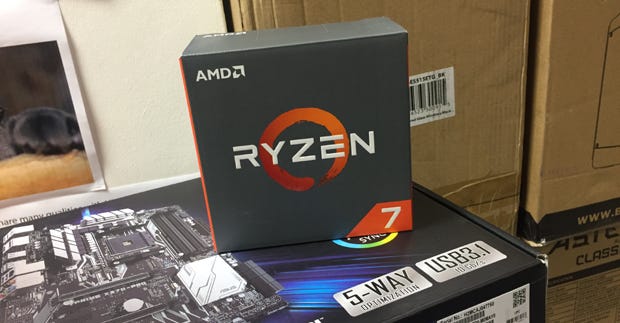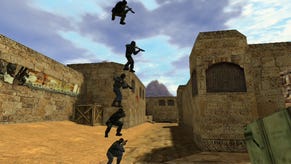Hands on with AMD's fab new Ryzen CPU
Making AMD great again!
Rejoice, for AMD's new Ryzen CPU is here. And it's good. Thank science for that. Another dud from AMD didn't bear thinking about. Instead, we get to ponder just how good Ryzen is and indeed how good it truly needs to be. It isn't the very fastest CPU money can buy or the greatest gaming CPU ever. But that's just dandy. It's still going to blow the PC processor market wide open and force Intel to seriously up its game.
If you want the background to AMD's new chip and a broad overview on what makes it tick, head over here. The task this week is to get a quick feel for what Ryzen is actually like.
The chip I've played with briefly is the middling model of the launch trio, the Ryzen 7 1700X. Like the other two Ryzen chips AMD is making available at launch, it's an eight-core beast that crunches two software threads per core. Hexa-core and quad-core models are coming, but aren't quite ready for launch day.
The 1700X clocks in nominally at 3.4GHz with a potential 3.8GHz turbo mode. The 'X' suffix, incidentally means it sports AMD's new XFR auto-overclocking feature, a bit more on which in a moment. For the record the other two chips are the 3.0GHz/3.7GHz 1700 and the 3.6GHz/4GHz 1800X.
Pricing for the 1700X is £399. The 1800X rocks in around £499 and the 1700 is yours for £329. Stick a $ sign in front of those numbers and you have the US price, which is both impressive and depressing depending on your point of view.
Without further ado, then, let's get busy. I couldn't resist firing up the fairly pointless Cinebench synthetic benchmark first, just to see those 16 threads in action. Fly my pretties:
Not that it matters much for the real world, but this thing flies in a multi-threaded benchmark like Cinebench. To give you a feel for just how quick it is, it's nearly two and a half times faster than the incumbent gamer's choice, the Intel Core i5-7600K. Yowsers.
Of course, multi-threading is only half – or should that be 15/16ths – of the story. AMD's big failure with its previous FX processors was single-threaded performance and it just so happens that games are particularly sensitive to just that.
In Cinebench's single-threaded mode, the Ryzen 7 1700X is between 10 and 20 per cent slower than various gaming-relevant Intel CPUs, with about 10% of that due to a slight comparative deficiency in Ryzen's architecture and the other 10% thanks to clockspeed.
Indeed, it was rumoured prior to launch that clock-for-clock and core-for-core, Ryzen would be roughly a match for Intel's Haswell-generation chips – the Core iSomething 4000 series chips, in other words. And so it proves in Cinebench.
Anyway, I mucked around with a few other canned benchmarks, all of which delivered similar kinds of results. Ryzen monsters quad-core Intel chips in multi-threading. In fact, it's on about a par with Intel's own eight-core beast, the 6900K for multithreading. Lest you have forgotten, that's more or less a £1,000 chip.
But what, you cry, of games? Don't panic, the news here is decent, too, if somewhat preliminary and indeed patchy. You can read detailed benchmarks elsewhere, but to give you one example, in Total War: Attila using the same video card and settings, the Ryzen 1700X cranks out an average of 39 frames per second to 40 from a Core i5-7600K. I got similar results in several other titles.
The first caveat to that is that I was running everything at 1440p and high detail settings, which tends to push things towards being GPU limited, even on an Nvidia GTX 1080. The handful of games I ran may also have somewhat flattered Ryzen. Among others, Tech Report's gaming numbers show that Ryzen can be a fair old bit off the current Intel pace in some games. Part of that is clockspeed, part of it is architecture and part is probably optimisation. You can be sure that few if any games exist that have been compiled to run well on Ryzen.
Really broadly, then, Ryzen looks like a goer for games but it will occasionally lag the best Intel chips in certain games, sometimes because the game doesn't scale well across lots of cores and on occasion probably because it's poorly optimised for Ryzen's processing peccadilloes. In that sense, these early eight-core chips are somewhat suboptimal for games with the possible exception of multi-tasking. If you want to game and stream your exploits at the same time, for instance, Ryzen looks like a killer solution. But a high clocked six-core Ryzen of the near future might be the best AMD bet for gamers.
If there is a disappointment, it's overclocking. All Ryzen CPUs will be unlocked for easy overclocking. But to cut a long story short, they don't overclock. Well, barely. I squeezed an extra 100MHz out of my chip and that was with water cooling. M'colleagues elsewhere in the reviewersphere report similar findings. Oh, and the XFR auto-overclocking feature doesn't improve on that. It may be of interest in future when Ryzen chips with more headroom appear. For now, it's fairly redundant.
That said, the 1700X I tested tended to max out at only 3.5GHz in multi-threaded workloads when running at standard rather than overclocked settings rather than the 3.8GHz promised by the chip's turbo mode. So, that 100MHz overclock was actually more like 400MHz in practice. But I'm not sure I actually care. My feeling coming in was that if Ryzen really was roughly on a par with Haswell and ran at about 3.5GHz, that would be plenty to put the frighteners on Intel. It does just that, so frankly I for one am satisfied.
Incidentally, if you're wondering about operating temps, have a scan of the web. I was only able to run my test chip with water cooling, so the 41 degrees C idle and 51 degrees under load aren't hugely helpful for the bulk of us that run fairly standard air coolers.
What we have then is a chip that isn't far off Intel for gaming and absolutely obliterates it for multi-threading performance when you factor in pricing. Regards the latter, this chip is literally half the price of Intel's eight-core 6900K. Staggering.
Of course, it's still bloody expensive at £399. Moreover, you're never actually going to feel the difference versus the plain old £329 Ryzen 7 1700. So of the initial launch chips, the 1700 is the obvious choice. It's an awesome all-rounder for the money.
However, I still think the sweet spot for most RPSers will likely be the future six-core model. It'll crank out the same gaming performance (well, in most games) as the eight-core model, just for less money, along with both pretty snazzy multi-threading for content creation and some multi-threading headroom to come as games gradually scale better across multiple cores.
Where all this leaves Intel is of course an interesting question. My sense in recent years is that readers have tired of the press bashing Intel for sandbagging, but for my money Ryzen completely confirms that narrative. It makes Intel's product line up look cynical and overpriced.
Personally, I can't see Intel slashing prices anything like enough to offset the yawning gap between it's six and eight-core CPUs and Ryzen. In reality, it doesn't matter much to Intel. Desktop CPUs aren't all that important and in any case, the likes of Dell will keep cranking out systems for mainstream punters and nobody will care much or notice much.
What Intel may do is hurry up the mainstream six-core model for the LGA1151 socket that appeared on its roadmaps recently. Suitably clocked and priced, that would put Intel in a reasonable if still not ideal competitive position.
In the meantime, I think enthusiasts will make something of a stampede towards Ryzen. It's just such a compelling value proposition, even if it remains somewhat unproven. It wouldn't surprise me to find a few bugs emerging (I hear it's a bit pernickety when it comes to certain memory configs, for instance) or a few weak spots in its performance profile shake out as the PC community probes its capabilities. AMD is but a small company and it probably doesn't have the manpower to completely finesse this new architecture first time around. Of course, if that's correct the upside is that scope remains for future revisions to turn a good chip into a great one.
Anyway, this is an initial hands-on, not an entirely definitive and forensic investigation. I'll have a look at the platform / motherboard part of the Ryzen story in a future post - PCI Express connectivity with Ryzen chips is an emerging concern, for instance. Overall, Ryzen is impressive even if the harsh reality is that the one group of PC users for whom Ryzen is probably least immediately compelling are gamers. But if I was buying a CPU right now, it would still be the base model eight-core Ryzen. It's not perfect and for pure gaming Intel still makes the best CPUs. But it's a really nice all-rounder for the money.













